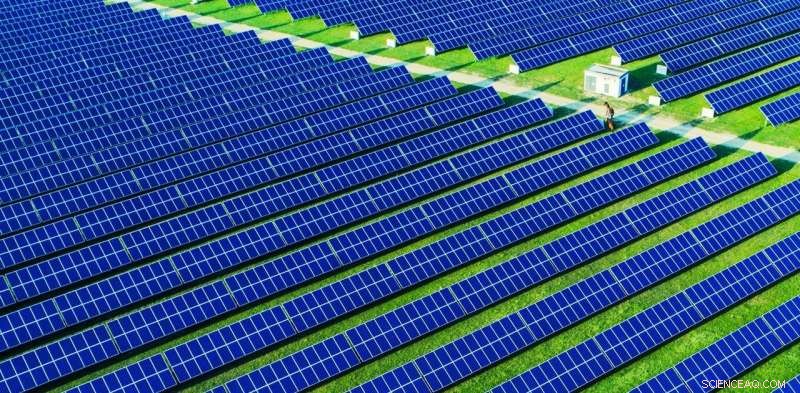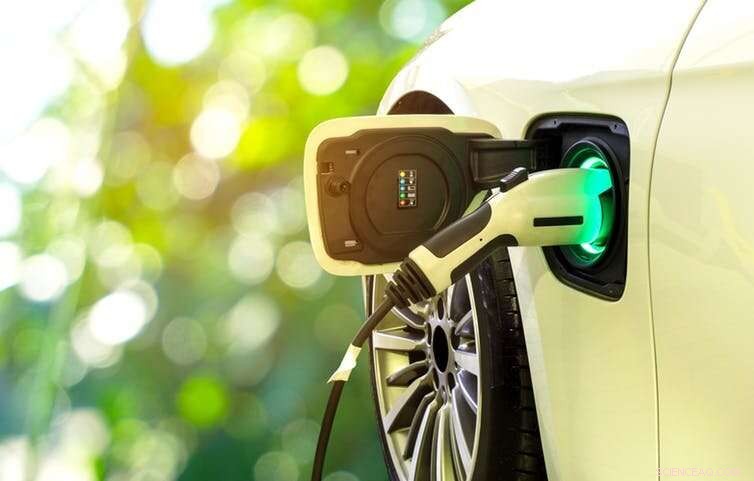En globaliseret soldrevet fremtid er økonomisk urealistisk

Kredit:Valentin Valkov/Shutterstock.com
I løbet af de sidste to århundreder, millioner af dedikerede mennesker – revolutionære, aktivister, politikere, og teoretikere – har ikke været i stand til at bremse den katastrofale og stadig mere globaliserede bane for økonomisk polarisering og økologisk nedbrydning. Det skyldes måske, at vi er fuldstændig fanget i mangelfulde måder at tænke teknologi og økonomi på – som den nuværende diskurs om klimaændringer viser.
Stigende drivhusgasemissioner skaber ikke kun klimaændringer. De giver flere og flere af os klimaangst. Dommedagsscenarier fanger overskrifterne i en accelererende hastighed. Forskere fra hele verden fortæller os, at emissionerne om ti år må være halvdelen af, hvad de var for ti år siden. eller vi står over for apokalypse. Skolebørn som Greta Thunberg og aktivistiske bevægelser som Extinction Rebellion kræver, at vi går i panik. Og med rette. Men hvad skal vi gøre for at undgå katastrofer?
De fleste videnskabsmænd, politikere, og virksomhedsledere har en tendens til at sætte deres håb i teknologiske fremskridt. Uanset ideologi, der er en udbredt forventning om, at nye teknologier vil erstatte fossile brændstoffer ved at udnytte vedvarende energi som sol og vind. Mange stoler også på, at der vil være teknologier til at fjerne kuldioxid fra atmosfæren og til "geoengineering" af jordens klima. Fællesnævneren i disse visioner er troen på, at vi kan redde den moderne civilisation, hvis vi skifter til nye teknologier. Men "teknologi" er ikke en tryllestav. Det kræver mange penge, hvilket betyder krav på arbejdskraft og ressourcer fra andre områder. Vi har en tendens til at glemme denne afgørende kendsgerning.
Jeg vil mene, at den måde, vi tager konventionelle "alle formål"-penge for givet, er hovedårsagen til, at vi ikke har forstået, hvordan avancerede teknologier er afhængige af tilegnelse af arbejdskraft og ressourcer fra andre steder. Ved at gøre det muligt at udveksle næsten alt - menneskelig tid, gadgets, økosystemer, uanset hvad - for alt andet på markedet, folk leder konstant efter de bedste tilbud, hvilket i sidste ende betyder at fremme de laveste lønninger og de billigste ressourcer i det globale syd.
Det er pengenes logik, der har skabt det fuldstændig uholdbare og væksthungrende globale samfund, der eksisterer i dag. For at få vores globaliserede økonomi til at respektere naturlige grænser, vi skal sætte grænser for, hvad der kan byttes. Desværre, det virker mere og mere sandsynligt, at vi bliver nødt til at opleve noget, der er tættere på en katastrofe – såsom en semi-global høstfejl – før vi er parate til seriøst at stille spørgsmålstegn ved, hvordan penge og markeder i øjeblikket er designet.
Grøn vækst?
Tag det ultimative problem, vi står over for:om vores moderne, global, og voksende økonomi kan drives af vedvarende energi. Blandt de fleste forkæmpere for bæredygtighed, såsom fortalere for en Green New Deal, der er en urokkelig overbevisning om, at problemet med klimaændringer kan løses af ingeniører.
Det, der generelt deler ideologiske holdninger, er ikke troen på teknologien som sådan, men hvilke tekniske løsninger man skal vælge, og om de vil kræve større politisk forandring. De, der forbliver skeptiske over for teknologiens løfter – såsom fortalere for radikal nedgearing eller nedvækst – har en tendens til at blive marginaliseret fra politik og medier. Indtil nu, enhver politiker, der seriøst går ind for degrowth, vil sandsynligvis ikke have en fremtid i politik.
Mainstream optimisme om teknologi omtales ofte som økomodernisme. Ecomodernist Manifest, en kortfattet redegørelse for denne tilgang offentliggjort i 2015, beder os om at omfavne teknologiske fremskridt, som vil give os "en god, eller endda fantastisk, Antropocæn." Den hævder, at teknologiens fremskridt har "afkoblet" os fra den naturlige verden og bør have lov til at fortsætte med det for at tillade naturens "genvildelse". Byernes vækst, industrielt landbrug, og atomkraft, det hævder, illustrere en sådan afkobling. Som om disse fænomener ikke havde økologiske fodspor ud over deres egne grænser.
I mellemtiden, opfordringer til en Green New Deal har været udtrykt i mere end et årti, men i februar 2019 tog den form af en beslutning til Det Amerikanske Repræsentanternes Hus. Centralt i dens vision er et storstilet skift til vedvarende energikilder og massive investeringer i ny infrastruktur. Dette vil muliggøre yderligere vækst i økonomien, det hævdes.
Nytænkning af teknologi
Så den generelle konsensus synes at være, at problemet med klimaændringer blot er et spørgsmål om at erstatte en energiteknologi med en anden. Men en historisk opfattelse afslører, at selve ideen om teknologi er uløseligt sammenflettet med kapitalakkumulering, ulige udveksling og ideen om penge til alle formål. Og som sådan det er ikke så nemt at redesigne, som vi kan lide at tro. At skifte den vigtigste energiteknologi er ikke kun et spørgsmål om at erstatte infrastruktur – det betyder at transformere den økonomiske verdensorden.
I det 19. århundrede, den industrielle revolution gav os forestillingen om, at teknologiske fremskridt simpelthen er menneskelig opfindsomhed anvendt på naturen, og at det ikke har noget at gøre med verdenssamfundets struktur. Dette er spejlbilledet af økonomernes illusion, at vækst ikke har noget med naturen at gøre og derfor ikke behøver at regne med naturlige grænser. I stedet for at se, at både teknologi og økonomi spænder over skellet mellem natur og samfund, teknik opfattes som kun at beskæftige sig med naturen og økonomi som kun at beskæftige sig med samfundet.
Dampmaskinen, for eksempel, betragtes simpelthen som en genial opfindelse til at udnytte kuls kemiske energi. Jeg benægter ikke, at dette er tilfældet, men dampteknologi i det tidlige industrielle Storbritannien var også betinget af, at der var akkumuleret kapital på de globale markeder. De dampdrevne fabrikker i Manchester ville aldrig være blevet bygget uden den trekantede atlantiske handel med slaver, rå bomuld, og bomuldstekstiler. Dampteknologi var ikke kun et spørgsmål om genial teknik anvendt på naturen – som al kompleks teknologi, den var også afgørende afhængig af globale udvekslingsforhold.
Denne teknologis afhængighed af globale sociale relationer er ikke kun et spørgsmål om penge. I en ret fysisk forstand, dampmaskinens levedygtighed var afhængig af strømmene af menneskelig arbejdskraft og andre ressourcer, der var blevet investeret i bomuldsfibre fra South Carolina, i USA, kul fra Wales og jern fra Sverige. Moderne teknologi, derefter, er et produkt af verdenssamfundets metabolisme, ikke blot resultatet af at afdække naturens "fakta".
The illusion that we have suffered from since the industrial revolution is that technological change is simply a matter of engineering knowledge, regardless of the patterns of global material flows. This is particularly problematic in that it makes us blind to how such flows tend to be highly uneven.
This is not just true of the days of the British Empire. To this day, technologically advanced areas of the world are net importers of the resources that have been used as inputs in producing their technologies and other commodities, such as land, labor, materialer, and energy. Technological progress and capital accumulation are two sides of the same coin. But the material asymmetries in world trade are invisible to mainstream economists, who focus exclusively on flows of money.
Ironisk, this understanding of technology is not even recognized in Marxist theory, although it claims to be both materialist and committed to social justice. Marxist theory and politics tend toward what opponents refer to as a Promethean faith in technological progress. Its concern with justice focuses on the emancipation of the industrial worker, rather than on the global flows of resources that are embodied in the industrial machine.
This Marxist faith in the magic of technology occasionally takes extreme forms, as in the case of the biologist David Schwartzman, who does not hesitate to predict future human colonization of the galaxy and Aaron Bastani, who anticipates mining asteroids. In his remarkable book Fully Automated Luxury Communism:A Manifesto, Bastani repeats a widespread claim about the cheapness of solar power that shows how deluded most of us are by the idea of technology.
Nature, he writes, "provides us with virtually free, limitless energy." This was a frequently voiced conviction already in 1964, when the chemist Farrington Daniels proclaimed that the "most plentiful and cheapest energy is ours for the taking." More than 50 years later, the dream persists.
The realities
Electricity globally represents about 19% of total energy use—the other major energy drains being transports and industry. I 2017 only 0.7% of global energy use derived from solar power and 1.9% from wind, while 85% relied on fossil fuels. As much as 90% of world energy use derives from fossil sources, and this share is actually increasing. So why is the long-anticipated transition to renewable energy not materializing?
One highly contested issue is the land requirements for harnessing renewable energy. Energy experts like David MacKay and Vaclav Smil have estimated that the "power density"—the watts of energy that can be harnessed per unit of land area—of renewable energy sources is so much lower than that of fossil fuels that to replace fossil with renewable energy would require vastly greater land areas for capturing energy.
In part because of this issue, visions of large-scale solar power projects have long referred to the good use to which they could put unproductive areas like the Sahara desert. But doubts about profitability have discouraged investments. A decade ago, for eksempel, there was much talk about Desertec, a €400 billion project that crumbled as the major investors pulled out, en efter en.
Today the world's largest solar energy project is Ouarzazate Solar Power Station in Morocco. It covers about 25 square kilometres and has cost around US$9 billion to build. It is designed to provide around a million people with electricity, which means that another 35 such projects—that is, US$315 billion of investments—would be required merely to cater to the population of Morocco. We tend not to see that the enormous investments of capital needed for such massive infrastructural projects represent claims on resources elsewhere—they have huge footprints beyond our field of vision.
Også, we must consider whether solar is really carbon free. As Smil has shown for wind turbines and Storm van Leeuwen for nuclear power, the production, installation, and maintenance of any technological infrastructure remains critically dependent on fossil energy. Selvfølgelig, it is easy to retort that until the transition has been made, solar panels are going to have to be produced by burning fossil fuels. But even if 100% of our electricity were renewable, it would not be able to propel global transports or cover the production of steel and cement for urban-industrial infrastructure.

Credit:Valentin Valkov/Shutterstock.com
And given the fact that the cheapening of solar panels in recent years to a significant extent is the result of shifting manufacture to Asia, we must ask ourselves whether European and American efforts to become sustainable should really be based on the global exploitation of low-wage labor, scarce resources and abused landscapes elsewhere.
Collecting carbon
Solar power is not displacing fossil energy, only adding to it. And the pace of expansion of renewable energy capacity has stalled – it was about the same in 2018 as in 2017. Meanwhile, our global combustion of fossil fuels continues to rise, as do our carbon emissions. Because this trend seems unstoppable, many hope to see extensive use of technologies for capturing and removing the carbon from the emissions of power plants and factories.
Carbon Capture and Storage (CCS) remains an essential component of the 2016 Paris Agreement on climate change. But to envisage such technologies as economically accessible at a global scale is clearly unrealistic.
To collect the atoms of carbon dispersed by the global combustion of fossil fuels would be as energy-demanding and economically unfeasible as it would be to try to collect the molecules of rubber from car tires that are continuously being dispersed in the atmosphere by road friction.
The late economist Nicholas Georgescu-Roegen used this example to show that economic processes inevitably lead to entropy—that is, an increase in physical disorder and loss of productive potential. In not grasping the implications of this fact, we continue to imagine some miraculous new technology that will reverse the Law of Entropy.
Economic "value" is a cultural idea. An implication of the Law of Entropy is that productive potential in nature—the force of energy or the quality of materials—is systematically lost as value is being produced. This perspective turns our economic worldview upside down. Value is measured in money, and money shapes the way we think about value. Economists are right in that value should be defined in terms of human preferences, rather than inputs of labor or resources, but the result is that the more value we produce, the more inexpensive labor, energy and other resources are required. To curb the relentless growth of value—at the expense of the biosphere and the global poor—we must create an economy that can restrain itself.
The evils of capitalism
Much of the discussion on climate change suggests that we are on a battlefield, confronting evil people who want to obstruct our path to an ecological civilization. But the concept of capitalism tends to mystify how we are all caught in a game defined by the logic of our own constructions—as if there was an abstract "system" and its morally despicable proponents to blame. Rather than see the very design of the money game as the real antagonist, our call to arms tends to be directed at the players who have had best luck with the dice.
I would instead argue that the ultimate obstruction is not a question of human morality but of our common faith in what Marx called "money fetishism." We collectively delegate responsibility for our future to a mindless human invention—what Karl Polanyi called all-purpose money, the peculiar idea that anything can be exchanged for anything else. The aggregate logic of this relatively recent idea is precisely what is usually called "capitalism." It defines the strategies of corporations, politicians, and citizens alike.
All want their money assets to grow. The logic of the global money game obviously does not provide enough incentives to invest in renewables. It generates greed, obscene and rizing inequalities, vold, and environmental degradation, including climate change. But mainstream economics appears to have more faith in setting this logic free than ever. Given the way the economy is now organized, it does not see an alternative to obeying the logic of the globalized market.
The only way to change the game is to redesign its most basic rules. To attribute climate change to an abstract system called capitalism—but without challenging the idea of all-purpose money—is to deny our own agency. The "system" is perpetuated every time we buy our groceries, regardless of whether we are radical activists or climate change deniers. It is difficult to identify culprits if we are all players in the same game. In agreeing to the rules, we have limited our potential collective agency. We have become the tools and servants of our own creation—all-purpose money.
Despite good intentions, it is not clear what Thunberg, Extinction Rebellion and the rest of the climate movement are demanding should be done. Like most of us, they want to stop the emissions of greenhouse gases, but seem to believe that such an energy transition is compatible with money, globalized markets, and modern civilization.

Locally produced goods. Credit:Alison Hancock/Shutterstock.com
Is our goal to overthrow "the capitalist mode of production"? Hvis så, how do we go about doing that? Should we blame the politicians for not confronting capitalism and the inertia of all-purpose money? Or—which should follow automatically—should we blame the voters? Should we blame ourselves for not electing politicians that are sincere enough to advocate reducing our mobility and levels of consumption?
Many believe that with the right technologies we would not have to reduce our mobility or energy consumption—and that the global economy could still grow. But to me that is an illusion. It suggests that we have not yet grasped what "technology" is. Electric cars and many other "green" devices may seem reassuring but are often revealed to be insidious strategies for displacing work and environmental loads beyond our horizon—to unhealthy, low-wage labor in mines in Congo and Inner Mongolia. They look sustainable and fair to their affluent users but perpetuate a myopic worldview that goes back to the invention of the steam engine. I have called this delusion machine fetishism.
Redesigning the global money game
So the first thing we should redesign are the economic ideas that brought fossil-fueled technology into existence and continue to perpetuate it. "Capitalism" ultimately refers to the artifact or idea of all-purpose money, which most of us take for granted as being something about which we do not have a choice. But we do, and this must be recognized.
Since the 19th century, all-purpose money has obscured the unequal resource flows of colonialism by making them seem reciprocal:money has served as a veil that mystifies exploitation by representing it as fair exchange. Economists today reproduce this 19th-century mystification, using a vocabulary that has proven useless in challenging global problems of justice and sustainability. The policies designed to protect the environment and promote global justice have not curbed the insidious logic of all-purpose money—which is to increase environmental degradation as well as economic inequalities.
In order to see that all-purpose money is indeed the fundamental problem, we need to see that there are alternative ways of designing money and markets. Like the rules in a board game, they are human constructions and can, in principle, be redesigned. In order to accomplish economic "degrowth" and curb the treadmill of capital accumulation, we must transform the systemic logic of money itself.
National authorities might establish a complementary currency, alongside regular money, that is distributed as a universal basic income but that can only be used to buy goods and services that are produced within a given radius from the point of purchase. This is not "local money" in the sense of LETS or the Bristol Pound – which in effect do nothing to impede the expansion of the global market—but a genuine spanner in the wheel of globalization. With local money you can buy goods produced on the other side of the planet, as long as you buy it in a local store. What I am suggesting is special money that can only be used to buy goods produced locally.
This would help decrease demand for global transports—a major source of greenhouse gas emissions—while increasing local diversity and resilience and encouraging community integration. It would no longer make low wages and lax environmental legislation competitive advantages in world trade, as is currently the case.
Immunizing local communities and ecosystems from the logic of globalized capital flows may be the only feasible way of creating a truly "post-capitalist" society that respects planetary boundaries and does not generate deepening global injustices.
Re-localizing the bulk of the economy in this way does not mean that communities won't need electricity, for eksempel, to run hospitals, computers and households. But it would dismantle most of the global, fossil-fueled infrastructure for transporting people, groceries and other commodities around the planet.
This means decoupling human subsistence from fossil energy and re-embedding humans in their landscapes and communities. In completely changing market structures of demand, such a shift would not require anyone—corporations, politicians, or citizens—to choose between fossil and solar energy, as two comparable options with different profit margins.
To return to the example of Morocco, solar power will obviously have an important role to play in generating indispensable electricity, but to imagine that it will be able to provide anything near current levels of per capita energy use in the global North is wholly unrealistic. A transition to solar energy should not simply be about replacing fossil fuels, but about reorganizing the global economy.
Solar power will no doubt be a vital component of humanity's future, but not as long as we allow the logic of the world market to make it profitable to transport essential goods halfway around the world. The current blind faith in technology will not save us. For the planet to stand any chance, the global economy must be redesigned. The problem is more fundamental than capitalism or the emphasis on growth:it is money itself, and how money is related to technology.
Climate change and the other horrors of the Anthropocene don't just tell us to stop using fossil fuels—they tell us that globalization itself is unsustainable.
Denne artikel er genudgivet fra The Conversation under en Creative Commons-licens. Læs den originale artikel. 
 Varme artikler
Varme artikler
-
 Londons Gatwick lufthavn solgt til det franske Vinci -konglomerat (opdatering)Gatwick driver verdens travleste landingsbane Det franske konglomerat Vinci sagde torsdag, at det havde købt kontrollen over Gatwick lufthavn, Storbritanniens næst travleste, for næsten tre millia
Londons Gatwick lufthavn solgt til det franske Vinci -konglomerat (opdatering)Gatwick driver verdens travleste landingsbane Det franske konglomerat Vinci sagde torsdag, at det havde købt kontrollen over Gatwick lufthavn, Storbritanniens næst travleste, for næsten tre millia -
 Edmunds fremhæver 10 bemærkelsesværdige nye biler for 2019Dette udaterede billede leveret af Volvo Cars of North America viser 2019 Volvo XC40, en mere overkommelig, nedskaleret version af den svenske bilproducents populære SUVer i mellemstørrelse og fuld st
Edmunds fremhæver 10 bemærkelsesværdige nye biler for 2019Dette udaterede billede leveret af Volvo Cars of North America viser 2019 Volvo XC40, en mere overkommelig, nedskaleret version af den svenske bilproducents populære SUVer i mellemstørrelse og fuld st -
 Bærbar tricorder scanner livstegnKredit:Engineering and Physical Sciences Research Council Forskere fra School of Engineering ved University of Glasgow har udviklet en håndholdt enhed til at tage medicinske aflæsninger fra patien
Bærbar tricorder scanner livstegnKredit:Engineering and Physical Sciences Research Council Forskere fra School of Engineering ved University of Glasgow har udviklet en håndholdt enhed til at tage medicinske aflæsninger fra patien -
 Fra flyselskaber til pizzeriaer, EU-virksomheder vedtager datalovgivningI denne onsdag, 16. maj, 2018 foto, Lisa Meyer føntørrer håret på en kunde i hendes hår- og skønhedsbutik i London. Meyers frisørsalon er et hyggeligt sted, hvor hendes mor serverer hjemmelavede makro
Fra flyselskaber til pizzeriaer, EU-virksomheder vedtager datalovgivningI denne onsdag, 16. maj, 2018 foto, Lisa Meyer føntørrer håret på en kunde i hendes hår- og skønhedsbutik i London. Meyers frisørsalon er et hyggeligt sted, hvor hendes mor serverer hjemmelavede makro
- NASA ser en skæv atlantisk tropisk storm Chantal-form
- Forskere udvikler ny nano-vaccine mod melanom
- Røntgenlaserforskere udvikler en ny måde at se bakterier angribe antibiotika
- Hvad eksisterede før Big Bang?
- Undersøgelse rekonstruerer gamle storme for at hjælpe med at forudsige ændringer i tropisk cyklon…
- Politiets brug af sociale medier til at levere nyheder vækker bekymring


